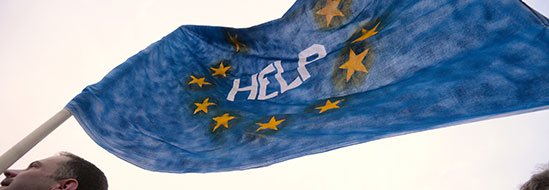Press freedom at risk as EU struggles to match action with values
The European Union strives to be a global leader in press freedom but faces challenges from member states that have criminal defamation and blasphemy laws, and have introduced counterterrorism measures, including mass surveillance. The EU has made press freedom imperative in negotiating with candidate countries, but has been accused of failing to take strong action when member states renege on their press freedom commitments. Journalists working in the region are also affected by EU laws and policies, such as the trade secrets directive and access to information regulations. A special report by the Committee to Protect Journalists

Published September 29, 2015
TABLE OF CONTENTS
StoryMap: Press freedom in EU candidate countries
1. Challenges to press freedom in the EU
The EU’s policies are based on human rights and democracy and it scores well in international press freedom rankings. But serious challenges remain, with disunity among member states on issues such as media laws and how much control to concede to the EU.
(ii) Press freedom in member states
Membership in the EU means upholding the principles of the EU Charter of Fundamental Rights. Yet journalists in many member states face the risk of legal action from defamation and blasphemy laws, repressive legislation that hinders their ability to cover the news, and violence from criminal organizations, protesters, and extremist groups.
Sidebar: Adding forces or shirking responsibilities? The EU and intergovernmental bodies
(iii) The rule of law mechanism
Legal mechanisms exist to confront countries when they backtrack on their responsibilities as a member state, yet when the EU is challenged it struggles to find consensus to use such measures.
Sidebar: Hungary’s challenge to the EU
2. How EU policies and law influence journalism
Nearly everything the EU does has an impact on journalists and how they work—from directives on public service broadcasting and the digital agenda to guidelines on hate speech and the funding of media projects. Some press freedom advocates and publishers fear the EU’s reach is giving it too much influence over the media.
While access to information over trade and policy negotiations has improved in recent years, the EU could enhance transparency. Many documents covering budgets, trade deals, and draft directives remain off limits, and uneven rules across member states on the protection of whistleblowers and sources puts the press at risk.
As the EU strives to become a leader in the digital market while implementing counter-terrorism measures, press freedom advocates fear the potential imposition of restrictions and censorship on Web reporting, and the exposure of journalists and sources to surveillance.
Sidebar: In times of crisis, press freedom curtailed
3. The EU’s international record on press freedom
When it comes to dealing with repressive countries that are strategic partners, realpolitik often trumps ideals, and the EU response is limited to how much power member states have been willing to concede to it. The inconsistent approach risks damaging the EU’s reputation as a global leader.
Sidebar: Reaction to Russia is too little too late
(ii) Joining the club: Accession and press freedom
The accession process for potential member states is the point at which the EU has its greatest leverage. Without a strong mechanism to tackle member states that backtrack, the EU needs to be tougher on accession countries.
Sidebar: How Turkey backtracked on accession responsibilities
CPJ’s recommendations to the EU as an institution and EU member states
(Photo by AFP/Attila Kisbenedek)